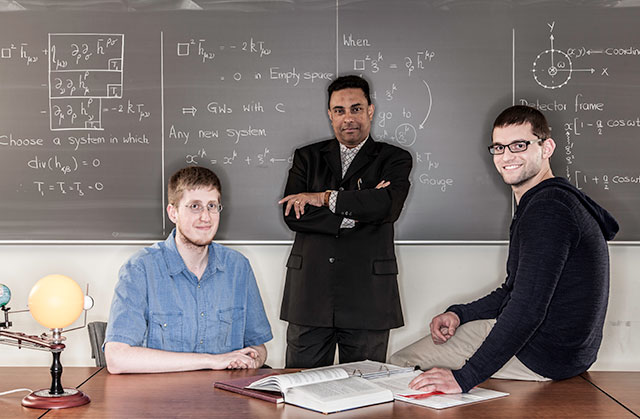
Mitchell Revalski and Will Rhodes are trying to pry secrets from the cosmos. Later this month, the two physics majors will reveal what they’ve learned at the San Cugat Forum on Astrophysics in Barcelona, Spain.
In all likelihood, they’ll be the only undergraduates in the room.
For the past year they have been searching for a theoretical view of the universe that is very far away and very early in time — 13.8 billion years ago, to be precise, a split-second after the Big Bang, when the universe violently expanded and then cooled. Together with physics Professor Thulsi Wickramasinghe, they are studying gravitational waves, a term used to describe ripples produced by the birth of the universe, which still exist in a weakened state.
The trio is examining whether gravitational waves bumped into the charged particles formed after the Big Bang, causing the accelerating particles to emit light. It’s a controversial point of view.
To date scientists searching for official evidence of these waves passing by the Earth have come up short, although astronomers from the Harvard-Smithsonian Center for Astrophysics reported last month that they had detected them with telescopes at the South Pole. The finding, as yet uncorroborated, is certain to enliven discussions at the San Cugat Forum April 22–25.
“It will be a tremendous opportunity to learn from and hear talks from some of the best people in the world, as well as present some of our developing work on the subject,” said Revalski, a senior who plans to pursue a Ph.D. in astronomy. “Our ultimate goal is compile and polish all our work in a nice coherent fashion.”
The students work independently, then meet with Wickramasinghe twice a week and bounce ideas off each other. “We generate ideas, and there’s no immediate concern, ‘Is this right?’ It feels like a very creative environment,” said Rhodes, who decided to become an astronomer in fourth grade.
“You read something five times before it makes sense and then you do some equations. Finally, you have an equation that makes sense. The sense of clarity you get, and the ‘Wow’ factor that results, happens once a week or a month. That’s why I keep doing it.”
—Mary Jo Patterson
